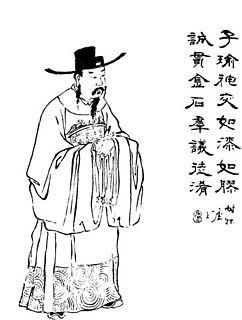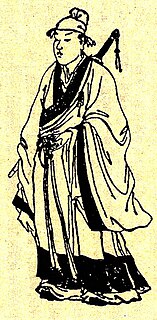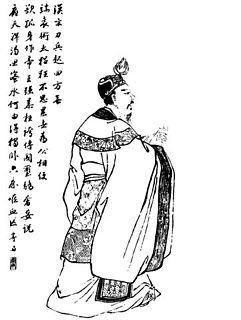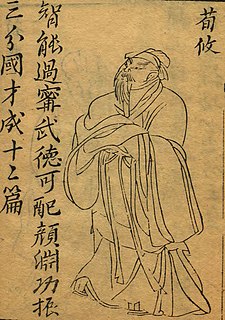
Lü Bu, courtesy name Fengxian, was a military general and warlord who lived during the late Eastern Han dynasty of Imperial China. Originally a subordinate of a minor warlord Ding Yuan, he betrayed and murdered Ding Yuan and defected to Dong Zhuo, the warlord who controlled the Han central government in the early 190s. In 192, he turned against Dong Zhuo and killed him after being instigated by Wang Yun and Shisun Rui, but was later defeated and driven away by Dong Zhuo's followers.

Zhuge Jin, courtesy name Ziyu, was a Chinese military general and politician of the state of Eastern Wu during the Three Kingdoms period of China. Born in the late Eastern Han dynasty, Zhuge Jin started his career in the 200s as an official under the warlord Sun Quan, who later became the founding emperor of Eastern Wu in the Three Kingdoms period. In 215, he served as Sun Quan's representative in a territorial dispute over southern Jing Province between Sun Quan and his ally, Liu Bei. In 219, he joined Sun Quan's general Lü Meng in an invasion of Liu Bei's territories in Jing Province after Sun Quan broke the Sun–Liu alliance. He was subsequently appointed as a general and commandery administrator. Before the Battle of Xiaoting of 221–222, Zhuge Jin attempted to dissuade Liu Bei from going to war with Sun Quan but was unsuccessful. The battle ultimately concluded with victory for Sun Quan's side; both sides made peace later and reestablished an alliance between the Eastern Wu and Shu Han states against their rival state, Cao Wei. From 222 until his death in 241, despite being rather incompetent in military affairs, Zhuge Jin served as one of Eastern Wu's top generals and participated in some battles against Cao Wei forces.

Guo Jia (170–207), courtesy name Fengxiao, was an adviser to the warlord Cao Cao during the late Eastern Han dynasty of China. Throughout his 11 years of service, Guo Jia aided Cao Cao greatly with his brilliance and foresight, and his strategies were instrumental to Cao Cao's triumphs over rival warlords such as Lü Bu and Yuan Shao. For example, four years before Cao Cao's decisive victory over Yuan Shao at the Battle of Guandu, Guo Jia already foresaw that Cao Cao would win when he pointed out ten advantages Cao Cao had over Yuan Shao.

Yuan Shu, courtesy name Gonglu, was a Chinese military general, politician, and warlord who lived during the late Eastern Han dynasty. He rose to prominence following the collapse of the Han central government in 189. He declared himself Emperor of China in 197 under the short-lived Zhong dynasty, two years before his death in 199.
Ji Ling was a military general serving under the warlord Yuan Shu during the late Eastern Han dynasty of China.

Xun You (157–214), courtesy name Gongda, was a statesman who lived during the late Eastern Han dynasty of China and served as an adviser to the warlord Cao Cao. Born in the influential Xun family of Yingchuan Commandery, Xun You was recruited into the civil service by the general He Jin. When the warlord Dong Zhuo hijacked and controlled the Han central government between 189 and 192, Xun You plotted with four others to assassinate him but was discovered and imprisoned. Following his release after Dong Zhuo's death, he wanted to serve as the Administrator of Shu Commandery but eventually settled as an official in Jing Province.
Gao Shun was a military officer serving the warlord Lü Bu during the late Eastern Han dynasty of China. Although he only had 700 men under his command, his unit was nicknamed as the "camp crusher " (陷陣營) for its destructive charges. Gao came to be known as Lü Bu's most able commander. His noted accomplishments included conquest of Xiaopei and the subsequent victory over a relief force led by Xiahou Dun, a prominent general under the warlord Cao Cao. In the same year, however, Cao personally laid a siege on Lü Bu's base in Xiapi, and defeated and captured Lü Bu. Gao was then executed along with his lord.
Hou Cheng was a military officer serving under the warlord Lü Bu during the late Eastern Han dynasty of China.

Chen Gong, courtesy name Gongtai, was an adviser to the warlord Lü Bu in the late Eastern Han dynasty of China. However, he had started his career under another warlord, Cao Cao, before defecting to Lü Bu. He was executed along with Lü Bu after Cao Cao defeated Lü Bu at the Battle of Xiapi.
Chen Deng, courtesy name Yuanlong, was a Chinese military general and politician who lived in the late Eastern Han dynasty of China. Born in a family of government officials in Xu Province, he started his career as a county chief at the age of 24 and later became an agriculture official under Tao Qian, the Governor of Xu Province. After Tao Qian's death in 194, Chen Deng supported Liu Bei to be the new Governor. However, in 196, he was forced to become a subordinate of the warlord Lü Bu after the latter seized control of Xu Province from Liu Bei. During this time, Chen Deng and his father Chen Gui pretended to be loyal towards Lü Bu, while secretly undermining his influence by dissuading him from allying with another warlord Yuan Shu. Chen Deng also secretly agreed to serve as a mole in Xu Province for the warlord Cao Cao, who controlled the Han central government. Chen Deng was then appointed as the Administrator of Guangling Commandery. During the Battle of Xiapi of 198–199, Chen Deng led his troops to join Cao Cao and assisted him in defeating Lü Bu. After the victory, Chen Deng was given an additional appointment as General Who Calms the Waves. During his tenure in Guangling Commandery, he gained high popularity among the people for good and benevolent governance – to the point where the people even wanted to follow him after learning that he had been reassigned to another commandery. He also resisted two invasions by the forces of Sun Ce, a warlord who controlled territories in the Jiangnan region. He died in an unknown year at the age of 38 due to an illness caused by intestinal parasites.
Yang Feng was a military general who lived during the late Eastern Han dynasty of China.
Wu Jing was a Chinese military general and politician who lived during the late Eastern Han dynasty of China. He was a brother-in-law of the minor warlord Sun Jian, whose descendants became the royal family of the state of Eastern Wu in the Three Kingdoms period.
Xun Chen, courtesy name Youruo, was an official who lived during the late Eastern Han dynasty of China. Born in the influential Xun family of Yingchuan Commandery, he was the fourth brother of Xun Yu and a second cousins once removed of Xun You. He initially served as an adviser to the warlord Han Fu and later to another warlord, Yuan Shao.
Cao Bao was a military officer serving under Tao Qian, the Governor of Xu Province, during the late Eastern Han dynasty of China. He became a subordinate of Tao Qian's successor, Liu Bei, after Tao's death in 194. He was killed by Zhang Fei in 196 after a quarrel.
Yan Xiang, courtesy name Wenze, was an official who lived during the late Eastern Han dynasty of China. A similarly named Yan Xiang (閻象) also served under the warlord Yuan Shu as a registrar. Although it is not clear whether they were the same person, the historian Rafe de Crespigny mentioned that it could be assumed that Yan Xiang left Yuan Shu and defected to the Han central government, which was then under the leadership of the warlord Cao Cao.
Chen Gui, courtesy name Hanyu, was a Chinese politician who lived in the late Eastern Han dynasty of China.
Zhang Miao, courtesy name Mengzhuo, was a Chinese politician and warlord who lived in the late Eastern Han dynasty of China.
Liu Fu, courtesy name Yuanying, was a Chinese politician who lived during the late Eastern Han dynasty of China. While serving as the governor of Yang Province from 200 to 208, he relocated the province's administrative centre from Liyang to Hefei. During his tenure, Hefei became a highly militarised and well-defended military stronghold, which later served as a strategic location in several battles between the rival states of Cao Wei and Eastern Wu during the Three Kingdoms period (220–280).
Liu Yao (157–198), courtesy name Zhengli, was a Chinese politician and warlord who lived during the late Eastern Han dynasty of China. He was a descendant of Liu Fei, the eldest son of the Han dynasty's founding emperor, Liu Bang. When he was 18, he became famous after rescuing a relative who was being held hostage by bandits. He started his career in the Han civil service after being nominated as a xiaolian, and was known for his incorruptibility. In 194, although he was appointed by the Han imperial court as the governor of Yang Province, he barely managed to gain a foothold over his jurisdiction because the warlord Yuan Shu controlled a large part of the territories around the Huai River region in Yang Province. In 195, conflict broke out between Liu Yao and Yuan Shu, who sent his ally Sun Ce to attack Liu Yao. Sun Ce defeated Liu Yao and forced him to retreat south into present-day Jiangxi, where Liu Yao defeated a minor warlord Ze Rong and died of illness shortly later. His elder brother was Liu Dai, another prominent warlord.
The Battle of Xiapi was fought between the forces of Lü Bu against the allied armies of Cao Cao and Liu Bei from the winter of 198 to 7 February 199 towards the end of the Eastern Han dynasty in China. The battle concluded with victory for Cao Cao and Liu Bei.






